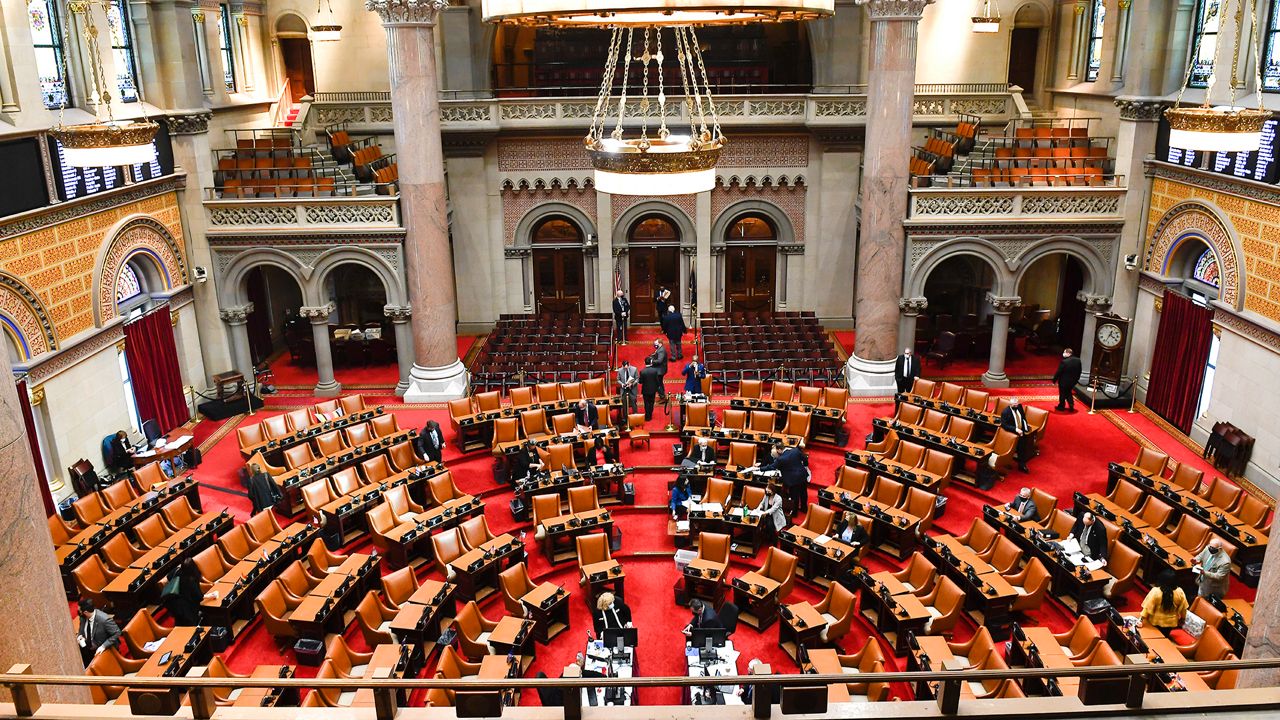ALBANY, N.Y. (AP) — New York is set to rely on an influx of federal funds and higher-than-expected tax revenues to balance a $220 billion, one-year state budget, which went into law Saturday.
The sale of to-go cocktails became legal once Gov. Kathy Hochul signed budget legislation Saturday.
Disagreements over policy issues held up passage of the spending plan over a week past an April 1 deadline. The budget has often served over the decades as a vehicle for passing major policy legislation, and elected officials are using this year’s to tackle issues expected to resonate with voters during an election year.
The budget boosts pay for health care and home care workers, shaves 16 cents off the cost of a gallon of gas through December and helps New Yorkers with unpaid rent and utility bills.
Some Democrats voted against parts of the spending plan, in part for cracking down on people with repeated low-level offenses. Those lawmakers also called for more spending on home care workers rather than spending an eventual $850 million supporting a new $1.4 billion stadium for the Buffalo Bills, which is owned by billionaires Terry and Kim Pegula.
Here’s a look at what’s in the budget.
TAX RELIEF
Homeowners can expect tax relief: New York will spend $2.2 billion in one-time property tax rebates for low- and middle-income homeowners. That rebate would arrive this fall, when the Democratic governor is set to appear on the ballot.
New York will also decrease tax rates for the middle class by $162 million by April 2023, instead of waiting until 2025 to fully phase in those long-planned tax cuts.
BAIL, GUN CRIMES
The budget follows through with Hochul’s proposal to give judges more power to jail people who were repeatedly ticketed for minor theft or property damage offenses.
Judges have to release people if the court determines the alleged theft is “negligible” and not “in furtherance of other criminal activity.”
Criminal justice advocates say the new law will lead to more poor and minority New Yorkers being held behind bars while awaiting trial.
New York has also added more firearm possession crimes to the list of offenses that could land people who can’t afford bail behind bars.
GAS TAX CUT
New York will cut state gas taxes by 16 cents a gallon from June 1 until the end of the year in response to soaring gasoline prices, with the state asking counties to consider doing the same.
TO-GO COCKTAILS
Liquor and wine are now available for take-out and delivery for three years, as long as the purchase includes a “substantial food item.”
That revives a practice instituted during the pandemic to help struggling restaurants.
State regulators will decide whether French fries or other snacks will count as “substantial” items.
MENTAL HEALTH
Courts can now order people to undergo more assisted outpatient treatment if they are perceived to be a threat to themselves or others.
It’s an expansion of Kendra’s Law, which New York passed on a trial basis in 1999 when 32-year-old Kendra Webdale was pushed in front of a subway train by a man living with untreated schizophrenia. The law is set to expire June 30, but New York is extending that expiration to 2027.
CASINOS, BUFFALO BILLS
The state will start accepting bids for three new casinos this year, one year earlier than planned. A new casino will need two-thirds approval from a community board consisting of political appointees selected by the governor, mayor and state and local representatives.
Hochul can also move forward with a deal to send $600 million in state funds for the Buffalo Bills’ new stadium. Erie County would pitch in another $250 billion.
The state will provide over $250 million in capital and maintenance subsidies over three decades.
Good government groups say there’s a potential conflict of interest: Hochul’s husband William works for Bills’ concession vendor Delaware North.
Hochul defended the deal as needed to ensure the Bills franchise doesn’t leave New York, telling the news program “Capital Tonight” on Friday she has a “very solid wall” between her work and her husband’s.
HOUSING HELP
The spending plan directs $250 million to help New Yorkers with unpaid utility bills and $925 million for landlords struggling with overdue rent amid the pandemic.
The budget excludes some measures backed by legislative Democrats, including $250 million for a new statewide rental subsidy.
CHILD CARE
New York will spend about $1 billion over the next fiscal year to increase eligibility for child care subsidies to 300% of the federal poverty level. That’s $83,250 for a family of four.
Hochul said the move will help expand access for more than half of New York’s young people.
The budget also increases reimbursement rates for certain child care providers.
HEALTH WORKER PAY
The state will spend $7.4 billion over several years to give a $3-per-hour raise to home care aides who bathe, feed and provide other non-medical services in clients’ homes.
That’s lower than the 50% minimum wage raise sought by backers of the Fair Pay for Home Care Act.
Aides generally are private employees, but the state Medicaid program funds about 90% of their services.
The budget also includes $1.2 billion in bonuses for other health care workers, aimed at keeping people in the industry after a grueling two years.
UNDOCUMENTED HEALTH
The budget pares down a proposed $345 million for a state health coverage option for more than 150,000 low-income New Yorkers whose immigration status bars them from getting health insurance.
Instead, New York will expand coverage for New Yorkers living in the state illegally who are age 65 or older.
CLIMATE SPENDING
Voters in November will decide whether to approve $4.2 billion in bonds to fund environmental and energy projects such as conservation, climate-change mitigation, zero-emission school busses and green buildings.
The budget doesn’t include Hochul’s proposal to ban natural gas in new buildings, to the disappointment of climate activists. She said she hopes to keep trying to pass that change.



